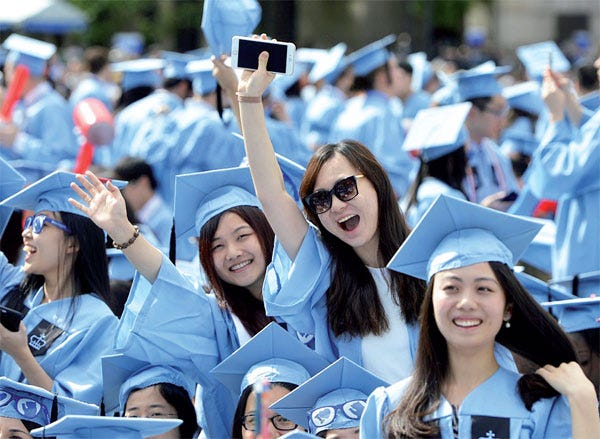US Universities Depend on Chinese Students, But Racism Pays Better
Why Trump talks about welcoming Chinese students while policies still shut them out
Trump’s Claim
Trump recently said America should welcome 600,000 Chinese students. His reason: “Without them, American universities will collapse.”
At first, it sounds exaggerated. But it is closer to reality than many admit.
The Numbers
At the peak, there were 370,000 Chinese students in the US. Today there are about 270,000, roughly one third of all international students.
They pay full tuition. They also spend heavily on housing, food, and transport. In 2023 alone, Chinese students paid 14.4 billion dollars in tuition and fees, nearly 30 percent of all US education exports, supporting over 143,000 jobs.
So in 2025, China has over 47 million higher education students. Against that, 600,000 in the US is nothing. It is a fraction. Yet some people keep saying “so many Chinese students in America.” It is not a lot. It is a tiny slice of the total.
Why Universities Depend on Them
State funding for public universities has collapsed over time. In 1980, half of their budgets came from state money. Today it is less than one quarter.
The gap is filled by higher tuition and international students. In graduate programs for math, computer science, and engineering, more than half of all students are now from China or India. Without them, many labs and departments would shut down.
Politics vs Economics
Trump was right on one thing. Without Chinese students, many US universities would not survive.
But here is the problem: money is not what drives US politics. Racism and exclusion do.
For politicians, attacking Chinese students wins more votes than welcoming them. Marjorie Taylor Greene said it directly: “If banning Chinese students makes 15 percent of schools close, then let them close.”
Contradictions in Policy
Trump says he welcomes students. But his government tightens visas, targets Chinese scholars, and fuels suspicion.
In May 2025, the State Department announced new visa rules that will “prioritize Americans over China,” reviewing all applicants from China and Hong Kong more strictly. At the same time, universities lobby Washington to relax the rules because their budgets depend on these students. Politics wins.
A Long History of Exclusion
This is not new. From the Chinese Exclusion Act of 1882 to Cold War purges, every time America feels insecure, Chinese people are treated as threats. Today’s suspicion of students is part of the same pattern.
A Strategic Angle
Some argue this is not only racism. If universities survive only on foreign tuition, maybe the system is unsustainable.
And when Chinese students return home with advanced knowledge, Washington sees it as strengthening a rival. From that view, restricting students is a defensive move to slow China’s growth.
What It Means for Students
Either way, the result is the same. US universities look like temples of knowledge, but they are businesses. International students are their clients. And when racist politics or security fears clash with economics, politics wins.
For Chinese students, this means studying in the US requires a clear head. Universities welcome your money, not your presence. What you learn may not only be a degree but also the reality of American society: dependence on you financially, hostility toward you politically.
The Global Competition
If the US closes its doors, others will open theirs. Europe, Singapore, and the Middle East are competing to attract Chinese students. If enough shift away, America will lose both money and influence. That is the real cost of short-term politics.
Closing Reflection
The question is not whether US universities need Chinese students. They do. The question is whether American politics will allow it. Every sign suggests hostility will outweigh economics.
That choice tells us something deeper. America is willing to sacrifice its own institutions for the sake of political theater. And that decision will shape US-China relations for the next decade.


As a Mexican I'm seeing for my future, and Chinese politics are now very interesting.
True.